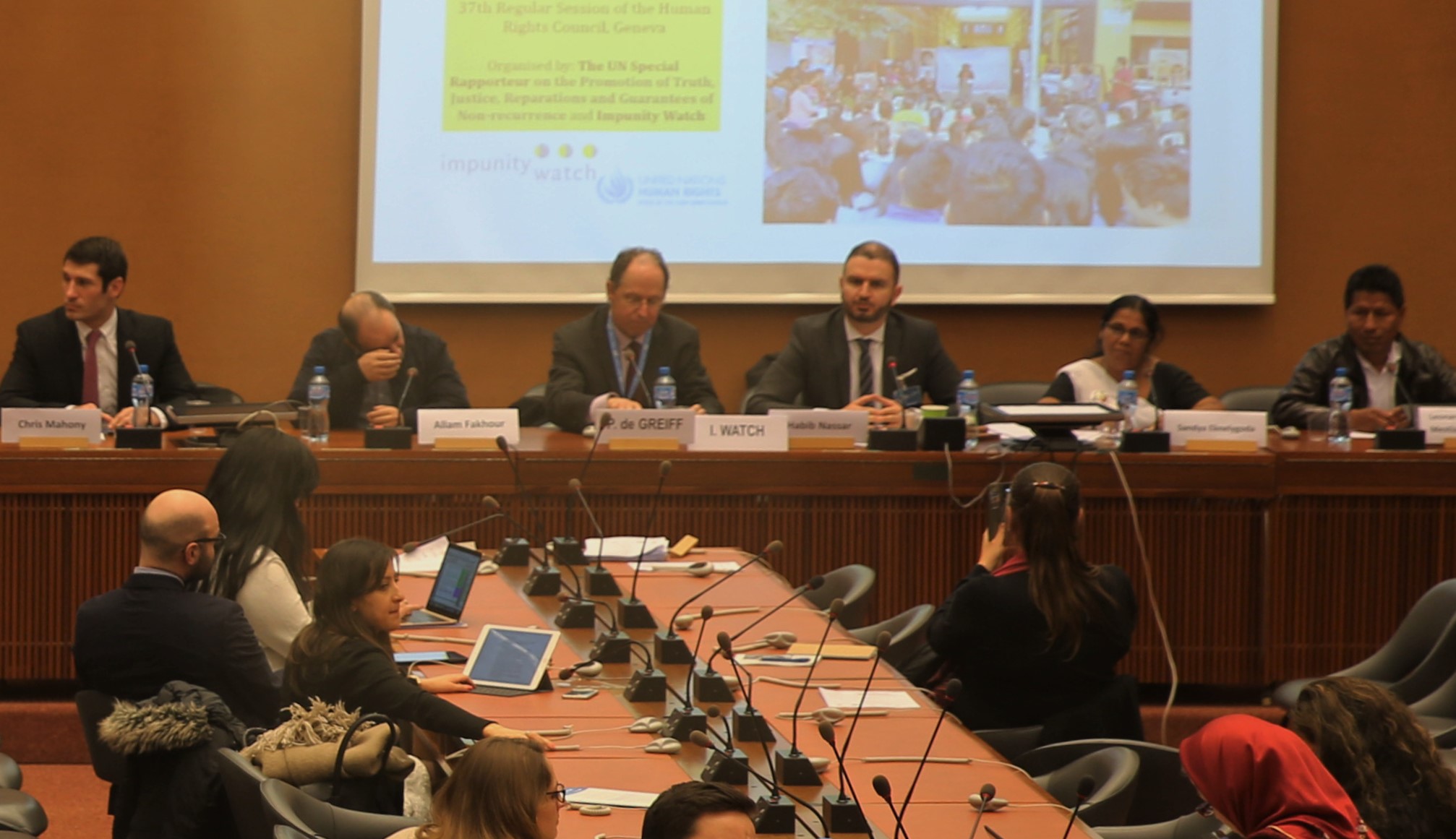Image: On 08th March at HRc 34 the Special Rapporteur on Truth, Justice, Reparations and Guarantees of non-Recurrence Pablo de Greiff discussed the importance of victim participation in TJ process . Sandaya , as a victim, shared her own experience in relation to public consultation and judicial process. ©s.deshapriya.
Issuing a statement Global Tamil Forum requests GoSL to ‘present a comprehensive strategy on transitional justice, with a time-bound plan’; ‘invite Office of the High Commissioner for Human Rights (OHCHR) to establish a full-fledged country presence’; ‘adopt legislation establishing a hybrid court, which should include international judges, defence lawyers, prosecutors and investigators’; and ‘operationalise the Office of Missing Persons Act and provide the Office of the Missing Persons with sufficient resources and technical means.’
Further it calls upon member states of the Human Rights Council to 1. Extend the timeline by the requested (by Sri Lanka) twenty four months to implement all of the requirements of resolution 30/1 of October 2015. 2. Must formally ensure that Sri Lanka makes a time bound delivery commitment to implement requirements of resolution 30/1 in full, without any exceptions. 3. Include a formal mechanism of monitoring of progress by OHCHR based from Sri Lanka .
GTF statement follows.
Global Tamil Forum urges UN Human Rights Council to adopt new resolution reflecting High Commissioner Zeid’s call to closely monitor Sri Lankan compliance with the resolution of 2015
The Global Tamil Forum (GTF) welcomes High Commissioner Zeid’s report on Sri Lanka released on 3 March in Geneva. We commend the High Commissioner and his office for their forthright and thorough assessment, and concur with their observation that ‘stronger, tangible results needed to be forthcoming without further delay to prevent any further dissipation of hard-earned trust.’
While acknowledging the Sri Lankan Government’s constructive engagement with United Nations’ human rights mechanisms; visible progress on constitutional reform process; positive developments on the broader human rights agenda; and commendable efforts on consultations towards establishing transitional justice measures, the report was emphatic that the ‘fulfilment of transitional justice commitments has been worryingly slow and the structures set up and measures taken were inadequate to ensure real progress.’
The report was categorical that the Government has not moved fast enough with tangible measures – viz. restitution of the land held by the military; resettlement of internally displaced persons; repealing the Prevention of Terrorism Act; effective conclusion of the cases of the remaining security detainees; formulating effective victims and witness protection arrangements; and stopping security force surveillance, harassment and torture – that would immensely help build confidence among victims and the Tamil community.
The report analysed a number of emblematic cases involving security forces covering a period of over ten years with no decisive progress to-date and reiterated High Commissioner’s view that ‘international participation in accountability mechanisms remains a necessary guarantee for the independence, credibility and impartiality of the process and an integral part of the commitments of the Government under Human Rights Council resolution 30/1.’ It is in this light that we are dismayed and reject the statements from the Sri Lankan leaders, including a recent statement from Prime Minister Wickremesinghe that argue participation of international judges would require constitutional amendments with approval from country wide referendum.
The High Commissioner’s assertion that unclear and often contradictory messages delivered on transitional justice mechanisms by the President, the Prime Minister, and various members of the cabinet, as a factor contributing towards contradictions in policy development and public messaging around transitional justice and reconciliation, need to be acted upon with utmost seriousness by the highest levels of the Sri Lankan government.
GTF calls upon the Government of Sri Lanka to make every effort to implement all of the recommendations presented in the High Commissioner’s report, which include: ‘present a comprehensive strategy on transitional justice, with a time-bound plan’; ‘invite Office of the High Commissioner for Human Rights (OHCHR) to establish a full-fledged country presence’; ‘adopt legislation establishing a hybrid court, which should include international judges, defence lawyers, prosecutors and investigators’; and ‘operationalise the Office of Missing Persons Act and provide the Office of the Missing Persons with sufficient resources and technical means’.
The High Commissioner’s recommendations to the member states ‘urge the Human Rights Council to continue its close engagement to monitor developments in Sri Lanka’, ‘investigate and prosecute those responsible for serious human rights violations under universal jurisdiction wherever possible’ and ‘ensure respect for the principle of non-refoulement in the case of Tamils who have suffered torture and human rights violations’. These recommendations are timely and need to be heeded.
In a press release by the OHCHR, High Commissioner Zeid said, “This critical opportunity in Sri Lankan history cannot be missed. I urge the Government and people of Sri Lanka to prioritize justice alongside reconciliation to ensure that the horrors of the past are firmly dealt with, never to recur.” GTF calls on the Government to do just that by publicising and acting on a comprehensive reform and transitional justice plan.
GTF requests the core-group and member states to consider the following in resolution 34/1;
1. Extend the timeline by the requested (by Sri Lanka) twenty four months to implement all of the requirements of resolution 30/1 of October 2015.
2. Must formally ensure that Sri Lanka makes a time bound delivery commitment to implement requirements of resolution 30/1 in full, without any exceptions.
3. Include a formal mechanism of monitoring of progress by OHCHR based from Sri Lanka
4. Delivery on these commitments must be formally reviewed on a more frequent basis (every six months) at the Council during the next two years, to avoid recurrence of non-delivery or partial delivery by Government of Sri Lanka by the end of the extended period.
GTF would like to reiterate its commitment to Sri Lanka’s transition to real peace, justice and prosperity, founded on genuine political power-sharing with all its peoples.
– 9 March 2017, London
